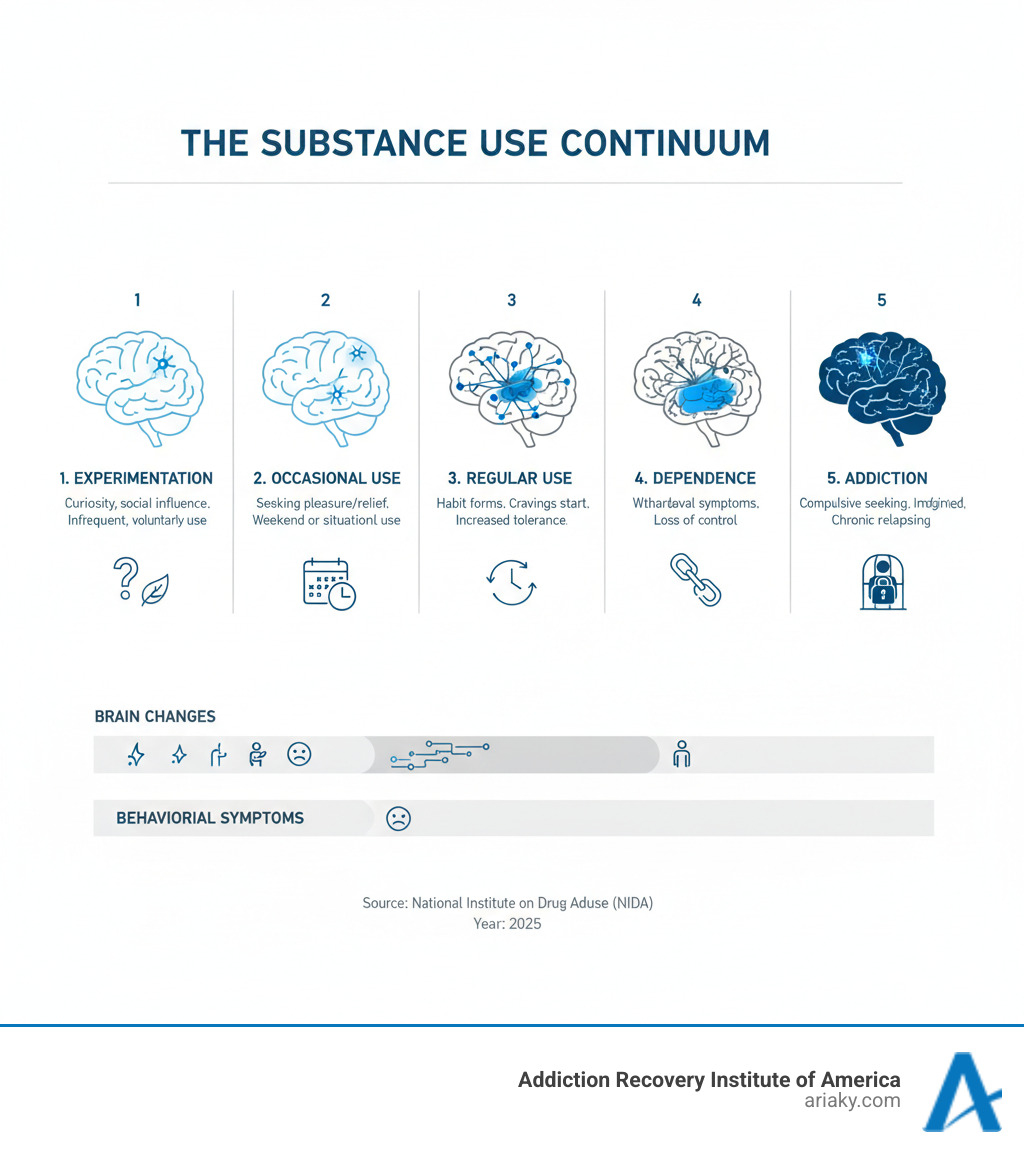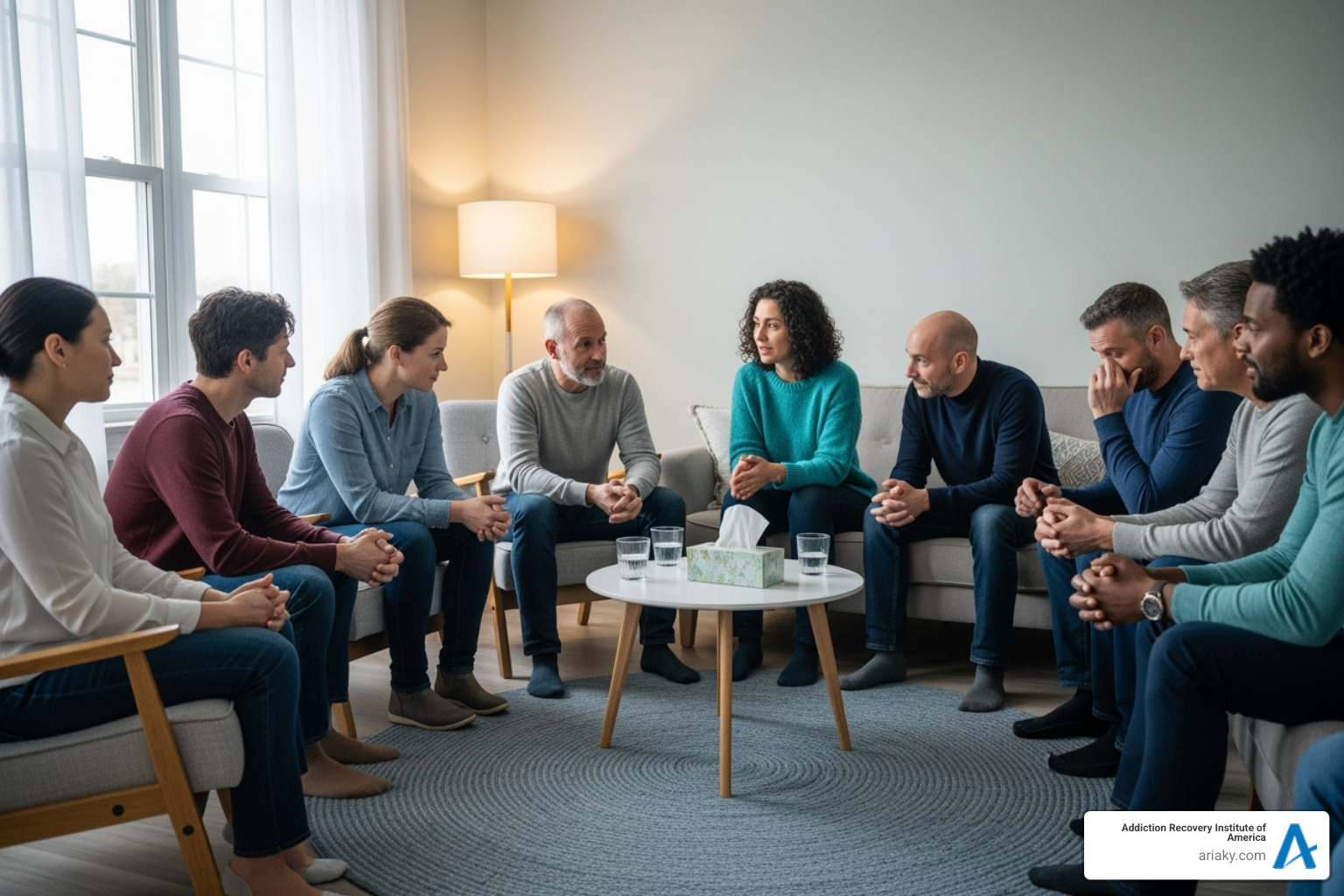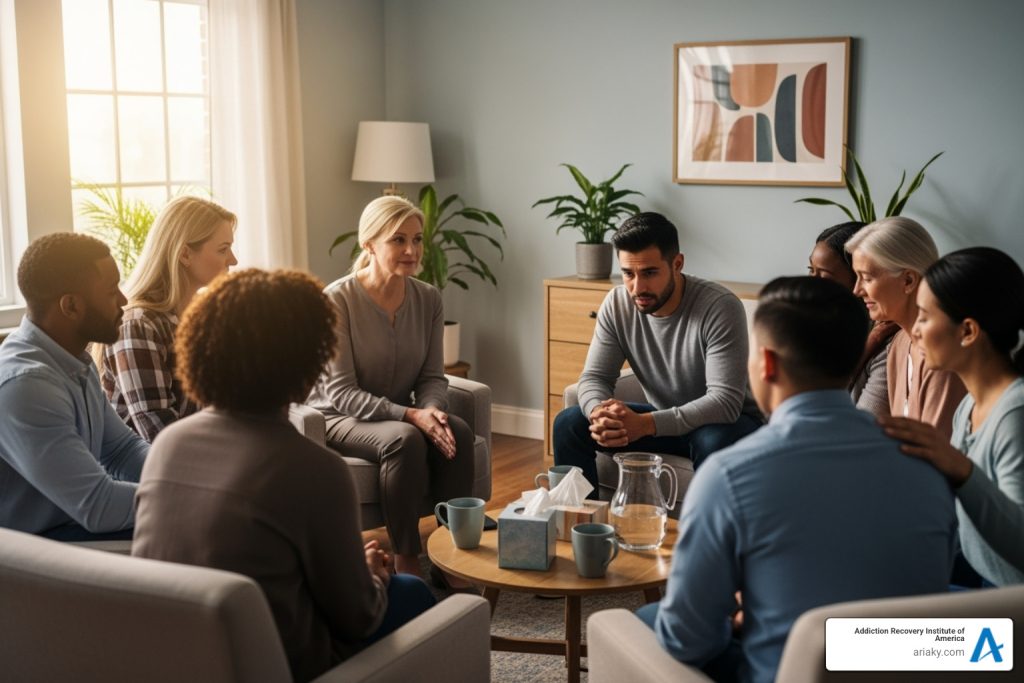Why Substance Abuse Treatment is Essential for Recovery
Substance abuse treatment is a comprehensive approach to helping individuals overcome addiction. Key treatment options include:
- Detoxification: Medically supervised withdrawal.
- Inpatient/Residential: 24-hour care in a structured setting.
- Outpatient Programs: Flexible treatment while living at home.
- Medication-Assisted Treatment: Therapy combined with FDA-approved medications.
- Therapy Programs: Individual, group, and family counseling.
Substance abuse affects 46.3 million Americans, making it a major public health crisis. Addiction is a chronic brain disease that impairs decision-making and self-control, and about half of those with substance use disorders also have co-occurring mental health conditions.
The good news is that recovery is absolutely possible. With the right treatment, millions have overcome addiction.
Getting help starts with understanding that treatment isn’t one-size-fits-all. It must be custom to your specific needs, the substances used, and any co-occurring conditions. Whether you need medical detox, residential care, or outpatient support, there is a path forward.
Taking the first step takes courage, but you’re not alone. Professional treatment provides the tools and medical care needed to break free from addiction safely.

Taking the First Step: How to Find Help for a Substance Use Disorder
Taking the first step toward recovery can feel overwhelming, but you don’t have to do it alone. The journey begins with a professional evaluation to connect you with the right treatment options. Confidentiality is protected, so you can explore your options without fear of judgment.
Getting Assessed for Treatment
An initial assessment is a conversation with a professional to understand your story. They’ll gather your medical history and substance use history to identify your specific needs and recommend the best treatment approach. Many use the SBIRT approach (Screening, Brief Intervention, and Referral for Treatment), an evidence-based method to connect you with care quickly. This assessment ensures you’re matched with the right level of care, as there’s no “one size fits all” solution.
If you’re in Kentucky, you can Contact Addiction Recovery Institute of America to schedule a confidential assessment. Our team is here to make the process as comfortable as possible.
Helplines and Online Resources
Help is available 24/7 through confidential national helplines and online resources that can provide crisis support and connect you with local treatment.
- The SAMHSA National Helpline at 1-800-662-HELP (4357) offers free, 24/7 treatment referrals and information in English and Spanish.
- The 988 Suicide & Crisis Lifeline provides immediate support via call or text. The Veterans Crisis Line is also available through 988 for specialized support.
- The Disaster Distress Helpline at 1-800-985-5990 offers crisis counseling for disaster-related distress.
- FindTreatment.gov is an anonymous tool to search for treatment centers by zip code, including free or low-cost options.
Reaching out is a sign of strength and the first step toward reclaiming your life.
Levels of Care: Exploring Different Types of Substance Abuse Treatment
Finding the right substance abuse treatment is easier when you understand the continuum of care—different levels of intensity designed to meet you where you are. The key is matching you to the right program at the right time.

At ARIA, we create individualized treatment plans because your story is unique. Our Kentucky Drug & Alcohol Rehab Programs adapt as your needs change throughout recovery.
Detoxification (Detox)
Detoxification is often the first step, providing medical supervision to manage withdrawal symptoms safely and comfortably. When you stop using a substance your body has become dependent on, withdrawal can be dangerous. Our medical team monitors you 24/7 to ensure your safety. We offer specialized programs like our Heroin Detox Program, Opiate Detox Program, and Prescription Drug Detox Program. We also have Detox Programs Florida available.
Inpatient and Residential Treatment
Residential treatment offers the most intensive care with 24-hour support in a structured, safe environment. By being removed from everyday triggers, you can focus entirely on recovery. Our Residential Treatment Program KY fosters a therapeutic community where staff and clients work together. Programs typically last 30 to 90 days, providing a strong foundation for sobriety.
Outpatient Treatment Programs
Outpatient programs allow you to practice recovery skills in the real world while living at home. This flexibility helps you balance recovery with life responsibilities.
- Our Outpatient Treatment Program KY involves fewer than 9 hours of therapy per week.
- Our Intensive Outpatient Program (IOP) Kentucky requires at least 9 hours weekly for more intensive support.
- Partial Hospitalization Programs (PHP) offer the highest level of outpatient care, with treatment several hours a day, five days a week.
Medication-Assisted Treatment (MAT) for Opioid Addiction
For opioid addiction, Medication-Assisted Treatment (MAT) is a highly effective approach that combines FDA-approved medications with counseling. MAT helps normalize brain function, reduce cravings, and prevent relapse.
- Methadone, Buprenorphine, and Naltrexone are common medications used. You can find local providers through the Buprenorphine Practitioners locator or Opioid Treatment Programs directory.
Our Opiate Addiction Treatment Program uses these life-saving medications. Effective substance abuse treatment meets you where you are, whether you need detox, residential, outpatient, or MAT support.
Inside a Treatment Program: What to Expect on Your Recovery Journey
Starting substance abuse treatment can feel uncertain, but our goal is to provide a supportive, structured environment where you can build skills for lasting sobriety.

Your days will follow a comforting routine of group therapy, individual counseling, educational sessions, and medication management. This balanced approach combines evidence-based therapies with holistic methods to help you develop coping skills, find peer support, and create a solid relapse prevention plan.
Core Therapeutic Approaches
Therapy is the heart of treatment, helping you uncover the “why” behind your substance use and develop strategies to prevent relapse.
- Cognitive Behavioral Therapy in our Cognitive Behavioral Therapy Program helps change negative thought patterns that fuel addiction.
- Our Individual Therapy Program offers a confidential space to develop personalized coping mechanisms.
- Our Group Therapy Program KY creates a supportive community where you can share experiences with peers.
- Our Family Therapy Program KY helps rebuild trust and improve communication with loved ones.
- Motivational Interviewing is a collaborative style that strengthens your personal motivation to recover.
- Our Trauma Related Addiction Program KY addresses underlying wounds that often contribute to substance use.
The Role of Support Systems in Substance Abuse Treatment
Recovery is a team effort built on strong connections. These support systems are foundational to long-term sobriety.
- Peer mentoring connects you with trained individuals in recovery who offer practical guidance and reduce feelings of isolation.
- Person-centered case management focuses on your strengths and goals, with a case manager who acts as your partner in creating a recovery plan.
- Building recovery capital involves strengthening all your resources—personal, social, and community-based—to support your journey.
- Community resources and aftercare planning connect you with groups like AA/NA and create a roadmap for maintaining sobriety after treatment.
- Reintegration treatment prepares you for returning to daily life with support for housing, employment, and legal needs.
Navigating the Logistics: Paying for Treatment and Finding Quality Care
Money worries shouldn’t prevent you from getting help. We understand that navigating the cost of substance abuse treatment can feel overwhelming, but many options are available.
Understanding the Costs and Payment Options
Treatment costs vary by program type and length. Here are common ways to pay:
- Health Insurance: Many private (HMO, PPO) and government (Medicaid, Medicare) plans cover a significant portion of rehab costs. Contact your provider to understand your benefits.
- Private Pay: Paying out-of-pocket offers flexibility, and many facilities provide payment plans.
- Sliding Scale Fees: Some centers adjust costs based on your income.
- Free or Low-Cost Options: Government-funded and non-profit programs offer care at little to no cost. FindTreatment.gov is a great resource for these.
Here’s a general comparison of average costs:
| Treatment Type | Average Cost Range |
|---|---|
| Detoxification | Starting around $1,750 |
| 3-Month Outpatient | Averaging $5,000 |
| Inpatient (per month) | Starting around $6,000 |
| Intensive Outpatient | $500 to $650 per day (can be $17,250 for a month-long program) |
| Partial Hospitalization | Averaging $400 per day (can be $12,000 for a 30-day period) |
These are averages; your costs may be lower with insurance. We can help you find a way to get the care you need.
How to Choose a Quality Substance Abuse Treatment Center
Picking the right substance abuse treatment center is a crucial decision. Here’s what to look for:
- Licensing and Accreditation: Ensure the facility is licensed by the state and accredited by a national organization.
- Staff Credentials: The team should include qualified, licensed doctors, nurses, and therapists. You can Meet the Aria Kentucky Team to see our professionals’ qualifications.
- Evidence-Based Practices: Quality centers use scientifically proven therapies like CBT, motivational interviewing, and MAT.
- Individualized Treatment Plans: Your plan should be custom to your unique history, needs, and goals.
- Continuum of Care: Look for facilities that offer a full range of services, from detox to aftercare planning.
- Transparency: A good center is open about its methods, costs, and success rates and will answer your questions clearly.
Your recovery deserves the best foundation you can find.
Frequently Asked Questions About Substance Abuse Treatment
We know that considering substance abuse treatment brings up many questions. Here are answers to some common concerns.
How long does rehab last?
There’s no single answer, as your recovery timeline is unique. It depends on the severity of addiction, substances used, and any co-occurring mental health conditions. Programs typically last 30, 60, or 90 days, with some long-term options available. The National Institute on Drug Abuse has found that programs lasting less than 90 days are generally less effective. Committing to at least three months allows for better outcomes, as it provides enough time to develop solid coping strategies.
Can I lose my job for going to rehab?
No, you generally cannot lose your job for seeking substance abuse treatment. Federal laws protect you:
- The Family and Medical Leave Act (FMLA) allows eligible employees to take up to 12 weeks of unpaid, job-protected leave for medical reasons, including addiction treatment.
- The Americans with Disabilities Act (ADA) considers addiction a disability, protecting you from discrimination for seeking help.
Your medical information is also kept strictly confidential under HIPAA. You typically only need to inform your employer that you are taking medical leave.
What happens after I complete a treatment program?
Completing a program is a major achievement, but recovery is a lifelong journey. Relapse is common, which is why a solid aftercare plan is crucial.
Before you leave, we’ll create a comprehensive plan that may include:
- Sober living homes: Supportive, structured environments to help you transition back to daily life.
- Support groups: Groups like Alcoholics Anonymous (AA) and Narcotics Anonymous (NA) provide a vital sense of community and peer support.
- Ongoing therapy: Individual, group, or family sessions help you manage new challenges.
- Relapse prevention plan: A personalized guide to recognize triggers, cope with cravings, and know what to do if you struggle.
- Alumni programs: These keep you connected to your recovery community for ongoing support.
With the right aftercare plan, lasting sobriety is absolutely achievable.
Begin Your Recovery Journey in Kentucky Today
Taking the first step toward substance abuse treatment requires tremendous courage, and we want you to know how much strength that represents. This moment of considering treatment is already a victory worth celebrating.
Recovery isn’t something that happens overnight – healing is a process that unfolds one day at a time. Some days will feel easier than others, and that’s completely normal. What matters most is that you’re not walking this path alone.
At the Addiction Recovery Institute of America (ARIA) in Kentucky, we’ve built our entire approach around understanding that your story is unique. We’re an accredited, AODE-certified addiction rehab center that believes deeply in the power of individualized care. Whether you need detox, residential treatment, PHP, or IOP, we design each program around your specific needs and circumstances.
Professional help is available right here in Kentucky, and we’ve seen countless individuals achieve lasting sobriety through our programs. Our team combines clinical expertise with genuine compassion, creating an environment where real healing can happen.
You might be feeling nervous, hopeful, scared, or determined – maybe all of these emotions at once. That’s perfectly okay. What you’re considering is life-changing, and it’s natural to have mixed feelings. The important thing is that lasting sobriety is absolutely achievable, and thousands of people have found their way to recovery through treatment.
We’re here whenever you’re ready to take that next step. Our team understands the challenges you’re facing because we’ve walked alongside many others on this same journey.
Ready to begin? Find a Lexington rehab center to start your path to recovery and find how our compassionate team can help guide you toward the healthier, more fulfilling life you deserve.


